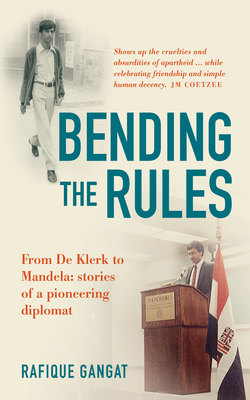Читать книгу Bending the Rules - Rafique Gangat - Страница 7
На сайте Литреса книга снята с продажи.
MULTINATIONAL CRICKET
ОглавлениеBowling on grass
While I was in Weenen I played first-league cricket on the weekends – for an Indian team in Ladysmith, called Wanderers. I made steady progress and, after paying my dues in the Natal Under-19 and Natal B teams, became a member of the Indian provincial team in 1977. As racial segregation was also imposed on sport, this was the zenith of what I could achieve in cricket.
Representing South Africa was merely a pipe dream.
As a sporting boycott had effectively isolated white sports teams from the international arena, the 1978 apartheid regime decided that “multinational” sport was permissible. This meant that teams of different races could play against each other, but there were to be no mixed-race teams. While previously we had been able to compete only against Indian teams, we could now play in a league against white teams on their superior playing fields.
Considering this to be the first step towards normalising sport, I teamed up with Centrals, a Durban-based club that had been accepted to play in the intercity or first league in Natal, where the standard was high and the competition extremely tough. To bolster his line-up, the captain, Yacoob Omar, had recruited me, along with my former Ladysmith team-mate Mustafa Khan.
When we arrived at the picturesque Pinetown grounds one Saturday afternoon, we were mobbed by the media and cheered by a host of faithful supporters, who thronged the grassy embankments. There were also four sets of eyes intent on watching much more than the cricket match. The security policemen were wearing plain clothes, ostensibly to blend in with the crowd, but they stuck out like sore thumbs. They weren’t exactly dressed like sports fans and besides, their grey shoes gave them away – at least, that was the joke among us.
The occasion was the first inter-racial cricket match in Natal. We walked onto the pitch to face Zingari, an all-white team that fielded many provincial stars and at least three South African Test players. Our team, on the other hand, comprised a motley crew of potentials. The only two with some international experience were Yacoob, who had played in the Lancashire League in England, and Mustafa, who had recently returned from a stint in the UK.
Yacoob won the toss and we opted to field. As the fastest bowler on the side, I was designated opening bowler. The new ball was handed to me and I cupped its shining red weight in the palm of my hand. Once the field was set and the opening batsmen arrived, I walked to my run-up mark. On the signal of the umpire I ran in to deliver the first ball bowled to a white batsman by a non-white bowler on that playing field. As I let go of the ball, South African Test wicketkeeper-batsman Tich Smith gleefully accepted my long hop and easily dispatched it to the midwicket boundary for a four.
Immediately, Yacoob ran up to me and yelled, “What you bowling? That was too short!”
“Hey, I’ve never bowled on grass before, although I have smoked the stuff,” I said.
A moment’s hesitation turned into a wry smile when Yacoob understood what I’d meant. With his arm draped around my shoulder, he walked me back to my mark while sharing some sound advice, “This is grass and you have to pitch the ball up to the batsman.”
The truth was that we, as Indian cricketers, had inferior sporting facilities. The apartheid regime provided only matting wickets and sand fields, with barely a semblance of grass. This grassy pitch was a huge leap from where I had played before, where the ball I had just bowled would have flown over the batsman’s head.
Nonetheless, I adapted quickly and, in a space of three balls, I had Smith caught behind by a late outswinger, much to the delight of my team and our supporters.
The match progressed well for us and we held our own against one of the best teams in the province. At the end of the day’s play, we packed up and prepared to go back to our designated residential area.
However, Vincent van der Bijl, the captain of the Zingari team, invited us for a drink in the clubhouse. As we stepped in, the security policemen stepped up and, in thick Afrikaans accents, ordered us to “leave now”! The liquor laws, which forbade different races from mixing socially, were still on the statute books and by entering the clubhouse we were liable to be fined, prosecuted, or both.
Vince managed to turn the unpleasant situation on its head: he surprised us all by buying a whole lot of drinks and getting the Indian waiters who worked in the clubhouse to deliver them to the centre of the field, smack-bang on the wicket. Players from the two teams sat around on the grass to enjoy a well-earned rest, a drink and to talk about the game after a tough day’s play.
Vince’s argument was, “If we can play together on this piece of grass, we can drink on it as well.”
This we did, under the watchful, disapproving eyes of the security policemen, who made sure they recorded our names and car licence-plate numbers.
The game continued the next day. We eventually lost, but having learnt the importance of adapting to changing wickets, we succeeded in winning some of our subsequent matches.
